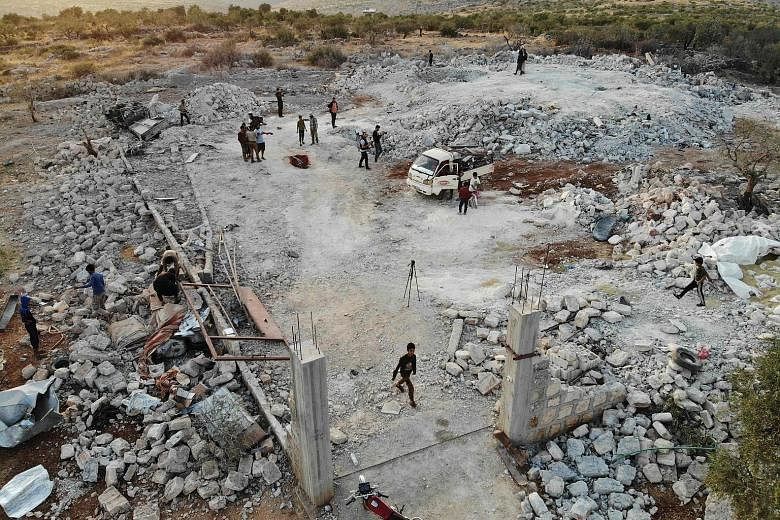WASHINGTON • He had been hunted for more than a decade, and the organisation he had built was designed partly on the assumption that this day would come.
The violent death of Abu Bakr al-Baghdadi, leader of the Islamic State in Iraq and Syria (ISIS), in a raid by American forces which US President Donald Trump announced on Sunday, is a significant blow to the world's most fearsome terrorist group.
But analysts said it was unlikely to freeze attempts by ISIS franchises and sympathisers around the world to sow mayhem and fear in the name of their extremist ideology.
Under Baghdadi, ISIS largely ran on its own. While he demanded fealty and built a cult of personality around himself - followers considered him the leader of Muslims worldwide - he was obsessed with security and is known to have given subordinates considerable latitude to act autonomously.
Numerous references in ISIS' propaganda offer reminders that its leaders may come and go, but the movement remains.
After all, the founder of ISIS and two successors were killed before Baghdadi became its leader and vastly expanded the group's sway in the Middle East and beyond.
And in his final years, Baghdadi stuck to such strict safety measures that he was believed to have been surrounded by just a small circle of direct contacts, including wives and children and a few trusted associates.
He limited communications with the outside world, according to US and Iraqi intelligence officials, which meant that his organisation operated with sparing input from him, lessening the practical effects of his demise.
In a further blow to the militant group, the Syrian Kurdish YPG militia said ISIS spokesman Abu Hassan al-Muhajir, described as Baghdadi's right-hand man, was killed hours later in a separate joint raid by Kurdish-led and US forces in northern Syria.
"For sure it is important, but we know from what we have seen from other organisations that getting rid of the leader does not get rid of the organisation," said Mr Hassan Abu Hanieh, a Jordanian expert on extremist groups.
"ISIS has created a new structure that is less centralised, and it will continue, even without Baghdadi."
Just in the past year, the group has claimed responsibility for deadly attacks in Afghanistan and France; a Cathedral bombing by an ISIS affiliate in the Philippines that killed 22 people; bombings in Sri Lanka that killed more than 250 people; and other attacks in Russia, Egypt, Australia and elsewhere.
ISIS had shown signs of reconstituting itself in remnants of its self-proclaimed caliphate, which once spanned a swathe of Syria and Iraq before it was destroyed by US-led forces in March.
The Pentagon said in January that ISIS was regenerating faster in Iraq than in Syria. Analysts estimated earlier this year that about 2,000 active combatants now operate in Iraq.
In Syria, ISIS has slipped into the shadows, staging suicide bombings and ambushes. It has carried out bomb attacks in towns and cities in northern Syria in the past year, including targeting US forces.
It remains active elsewhere, too. ISIS militants have carried out deadly bombings and shootings in Saudi Arabia against security forces and minority Shi'ite Muslims, after the authorities crushed an Al-Qaeda insurgency more than a decade ago.
In Afghanistan, the leadership of Islamic State in Khorasan pledged allegiance to Baghdadi, but it is not clear that this group has direct operational links with the main movement. It has claimed attacks on civilian targets in cities including Kabul and fought the Afghan Taleban for control of a number of rural districts. US commanders say its forces number fewer than 2,000.
In Indonesia, there has been a resurgence in militancy and the authorities have said they believe thousands of Indonesians draw inspiration from ISIS, while about 500 Indonesians are thought to have gone to Syria to join the group.
A court sentenced a cleric, Aman Abdurrahman, to death last year for masterminding deadly attacks. He is considered the ideological leader of Jemaah Ansharut Daulah (JAD) - a loose grouping of ISIS sympathisers in Indonesia.
Suicide bombings in May last year in the Indonesian port city of Surabaya, which killed more than 30 people, were linked to JAD cells.
The Philippines fears that extremists fleeing Iraq and Syria could find a safe haven in the jungles and remote villages of Muslim areas of Mindanao, where there is a long history of lawlessness, clan rivalry and separatist and Islamist rebellion.
Several splinter groups of the myriad armed groups in the southern Philippines have pledged allegiance to ISIS, although none is known to have been endorsed as its South-east Asian affiliate.
NYTIMES, REUTERS


